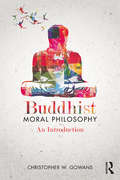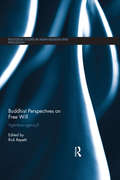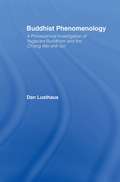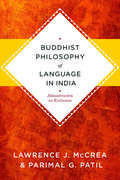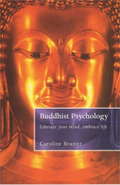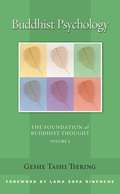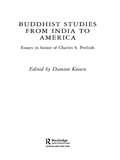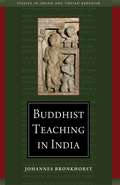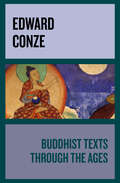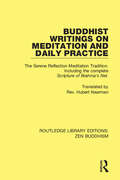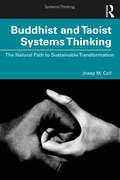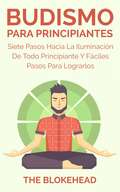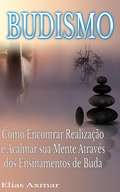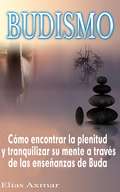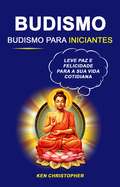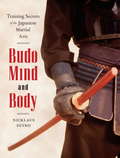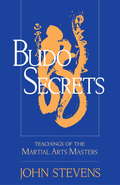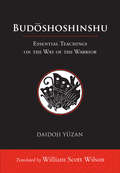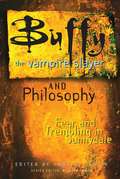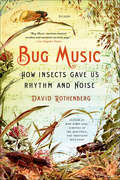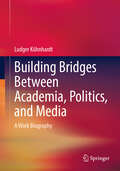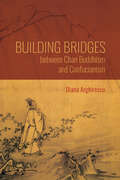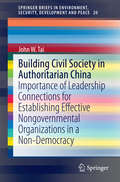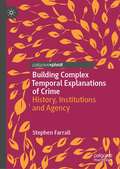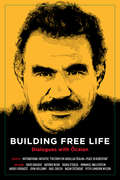- Table View
- List View
Buddhist Moral Philosophy: An Introduction
by Christopher W. GowansThe first book of its kind, Buddhist Moral Philosophy: An Introduction introduces the reader to contemporary philosophical interpretations and analyses of Buddhist ethics. It begins with a survey of traditional Buddhist ethical thought and practice, mainly in the Pali Canon and early Mah?y?na schools, and an account of the emergence of Buddhist moral philosophy as a distinct discipline in the modern world. It then examines recent debates about karma, rebirth and nirvana, well-being, normative ethics, moral objectivity, moral psychology, and the issue of freedom, responsibility and determinism. The book also introduces the reader to philosophical discussions of topics in socially engaged Buddhism such as human rights, war and peace, and environmental ethics.
Buddhist Perspectives on Free Will: Agentless Agency?
by Rick RepettiThroughout the history of Buddhism, little has been said prior to the Twentieth Century that explicitly raises the question whether we have free will, though the Buddha rejected fatalism and some Buddhists have addressed whether karma is fatalistic. Recently, however, Buddhist and Western philosophers have begun to explicitly discuss Buddhism and free will. This book incorporates Buddhist philosophy more explicitly into the Western analytic philosophical discussion of free will, both in order to render more perspicuous Buddhist ideas that might shed light on the Western philosophical debate, and in order to render more perspicuous the many possible positions on the free will debate that are available to Buddhist philosophy. The book covers: Buddhist and Western perspectives on the problem of free will The puzzle of whether free will is possible if, as Buddhists believe, there is no agent/self Theravāda views Mahāyāna views Evidential considerations from science, meditation, and skepticism The first book to bring together classical and contemporary perspectives on free will in Buddhist thought, it is of interest to academics working on Buddhist and Western ethics, comparative philosophy, metaphysics, philosophy of mind, philosophy of action, agency, and personal identity.
Buddhist Phenomenology: A Philosophical Investigation of Yogacara Buddhism and the Ch'eng Wei-shih Lun (Routledge Critical Studies in Buddhism #Vol. 13)
by Dan LusthausA richly complex study of the Yogacara tradition of Buddhism, divided into five parts: the first on Buddhism and phenomenology, the second on the four basic models of Indian Buddhist thought, the third on karma, meditation and epistemology, the fourth on the Trimsika and its translations, and finally the fifth on the Ch'eng Wei-shih Lun and Yogacara in China.
Buddhist Philosophy of Language in India: Jñanasrimitra on Exclusion
by Parimal Patil Lawrence J. McCreaJnanasrimitra (975-1025) was regarded by both Buddhists and non-Buddhists as the most important Indian philosopher of his generation. His theory of exclusion combined a philosophy of language with a theory of conceptual content to explore the nature of words and thought. Jnanasrimitra's theory informed much of the work accomplished at Vikramasila, a monastic and educational complex instrumental to the growth of Buddhism. His ideas were also passionately debated among successive Hindu and Jain philosophers.This volume marks the first English translation of Jnanasrimitra's Monograph on Exclusion, a careful, critical investigation into language, perception, and conceptual awareness. Featuring the rival arguments of Buddhist and Hindu intellectuals, among other thinkers, the Monograph reflects more than half a millennium of competing claims while providing an invaluable introduction to a crucial philosopher. Lawrence J. McCrea and Parimal G. Patil familiarize the reader with the author, themes, and topics of the text and situate Jnanasrimitra's findings within his larger intellectual milieu. Their clear, accessible, and accurate translation proves the influence of Jnanasrimitra on the foundations of Buddhist and Indian philosophy.
Buddhist Psychology
by Caroline BrazierWestern therapeutic approaches have often put considerable emphasis on building self-esteem and enhancing a positive sense of self. This book challenges the assumption behind this approach. Most of us protect ourselves against being fully alive. Because we fear loss and pain, we escape by withdrawing from experiences and distracting ourselves with amusements. We fall into habitual ways of acting and limit our experience to the familiar. We create an identity which we think of as a 'self', and in so doing imprison our life-energy.For 2500 years Buddhism has developed an understanding of the way that we can easily fall into a deluded view. It has shown how the mind clings to false perceptions and tries to create permanence out of an ever changing world. Written by a practising therapist and committed Buddhist, this book explores the practical relevance of Buddhist teachings on psychology to our everyday experience. By letting go of our attachment to self, we open ourselves to full engagement with life and with others. We step out of our self-made prison.
Buddhist Psychology
by Lama Thubten Zopa Rinpoche Geshe Tashi Tsering Gordon McdougallThis new volume from the Foundation of Buddhist Thought series, provides a stand-alone and systematic - but accessible - entry into how Buddhism understands the mind. Geshe Tashi, an English-speaking Tibetan monk who lives in London, was trained from boyhood in a traditional Tibetan monastery and is adept in communicating this classical training to a modern Western audience. Buddhist Psychology addresses both the nature of the mind and how we know what we know. Just as scientists observe and catalog the material world, Buddhists for centuries have been observing and cataloging the components of inner experience. The result is a rich and subtle knowledge that can be harnessed to the goal of increasing human well being.
Buddhist Studies from India to America: Essays in Honor of Charles S. Prebish (Routledge Critical Studies in Buddhism)
by Damien KeownBuddhist Studies from India to America covers four important areas of Buddhist Studies: Vinaya Studies and Ethics, the history of Buddhist schools, Western Buddhism, and Inter-religious dialogue. These are the main areas which Charles S. Prebish has either inaugurated or helped to define; and his academic career as a leading, international scholar, and his significant professional achievements are celebrated within this volume. The geographical and historical scope of the essays in this collection range from ancient India to modern America, and includes contributions by well-known international scholars. The contributors discuss a variety of academic disciplines including philosophy, psychology, history, feminism, and sociology. It will appeal to scholars whose interests embrace either ancient or modern aspects of the Buddhist tradition.
Buddhist Teaching in India
by Johannes BronkhorstThe earliest records we have today of what the Buddha said were written down several centuries after his death, and the body of teachings attributed to him continued to evolve in India for centuries afterward across a shifting cultural and political landscape. As one tradition within a diverse religious milieu that included even the Greek kingdoms of northwestern India, Buddhism had many opportunities to both influence and be influenced by competing schools of thought. Even within Buddhism, a proliferation of interpretive traditions produced a dynamic intellectual climate. Johannes Bronkhorst here tracks the development of Buddhist teachings both within the larger Indian context and among Buddhism's many schools, shedding light on the sources and trajectory of such ideas as dharma theory, emptiness, the bodhisattva ideal, buddha nature, formal logic, and idealism. In these pages, we discover the roots of the doctrinal debates that have animated the Buddhist tradition up until the present day.
Buddhist Texts Through the Ages
by Edward ConzeThe renowned scholar and translator presents an enlightening anthology of Buddhist writings that trace the development of Buddhism across the centuries. Edward Conze was one of the most important Buddhist scholars of the twentieth century, producing numerous influential translations of his own. In Buddhist Texts Through the Ages, Conze presents one of the most comprehensive anthologies of Buddhist writing ever published. The evolution of Buddhist philosophy and theology is represented through a wealth of original texts, all newly translated for this volume. Covering the breadth of Buddhist traditions, this volume incudes works translated from Pali, Sanskrit, Chinese, Tibetan, and Japanese. An ideal companion to Conze&’s essential text, Buddhism, this edition also includes a glossary of English and foreign terms.
Buddhist Writings on Meditation and Daily Practice: The Serene Reflection Tradition. Including the complete Scripture of Brahma's Net (Routledge Library Editions: Zen Buddhism)
by Hubert NearmanThis book, first published in 1994, is a compendium of new translations of certain works regarded as fundamental texts in the Serene Reflection Buddhist Tradition (S?t? Zen). All the texts were in Chinese, either as original works or as translations from Sanskrit. Several of them are central to the ceremonial not only of the S?t? Zen Tradition but also of other Mahayana Buddhist traditions as well.
Buddhist and Taoist Systems Thinking: The Natural Path to Sustainable Transformation (Systems Thinking)
by Josep M. CollBuddhist and Taoist Systems Thinking explores a radical new conception of business and management. It is grounded on the reconnection of humans with nature as the new competitive advantage for living organizations and entrepreneurs that aspire to regenerate the economy and drive a positive impact on the planet, in the context of the Anthropocene. Organizations today struggle in finding a balance between maximizing profits and generating value for their stakeholders, the environment and the society at large. This happens in a paradigm shift characterized by unprecedented levels of exponential change and the emergence of disruptive technologies. Adaptability, thus, is becoming the new business imperative. How can, then, entrepreneurs and organizations constantly adapt and, at the same time, design the sustainable futures they’d like? This book uniquely explores the benefits of applying Buddhist and Taoist Systems Thinking to sustainable management. Grounded in Taoist and Zen Buddhist philosophies, it offers a modern scientific perspective fundamentally based on the concepts of bio-logical adaptability and lifefulness amidst complexity and constant change. The book introduces the new concept of the Gaia organization as a living organism that consciously helps perpetuate the conditions for life on the planet. It is subject to the natural laws of transformation and the principles of oneness, emptiness, impermanence, balance, self-regulation and harmonization. Readers will find applied Eastern systems theories such as the Yin-Yang and the Five Elements operationalized through practical methodologies and tools such as T-Qualia and the Zen Business model. They are aimed at guiding Gaia organizations and entrepreneurs in leading sustainable transformations and qualifying economic growth. The book offers a vital toolkit for purpose-driven practitioners, management researchers, students, social entrepreneurs, evaluators and change-makers to reinvent, create and mindfully manage sustainable and agile organizations that drive systemic transformation.
Budismo Para Principiantes/ Siete Pasos Hacia La Iluminación De Todo Principiante.
by The BlokeheadBudismo fácil. Tu Vida Está A Punto de Mejorar Mucho. ¿Te sientes estresado? ¿Estás abrumado por las demandas diarias de tu vida y desearías estar más en paz y lograr concentración plena (mindfulness)? La Solución Para Tí. Budismo Para Principiantes- Siete Pasos Hacia la Iluminación de Todo Principiante y Fáciles Pasos Para Lograrlos. Este libro sirve como una forma de iluminación e información sobre el Budismo como un estilo de vida y como camino para estar mentalmente despierto. Un rápido vistazo del libro: ✔ Comprender las Cuatro Nobles Verdades ✔ Comprender el Noble Camino (Y Otros Caminos hacia la Iluminación) ✔ Aceptación ✔ Dejar ir ( No apegos) ✔ Y mucho, mucho más. ¡Para tener un acceso instantáneo, simplemente selecciona este libro para su compra! Author's biography: The Blokehead is an extensive series of instructional/how to books which are intended to present quick and easy to use guides for readers
Budismo: Como Encontrar Realização e Acalmar sua Mente Através dos Ensinamentos de Buda.
by Elias Axmar Jessica SantiagoNas páginas deste livro, você encontrará as respostas para essas perguntas e muito mais. Apenas algumas das questões e tópicos abordados incluem: O significado do Budismo História Budista e raízes no Hinduísmo Budismo Mahayana Budismo Theravada Budismo Tibetano Zen Budismo O Eu, Karma, Bardo e Reencarnação E muito mais! Receba o livro agora para aprender mais sobre o Budismo!
Budismo: Cómo encontrar la plenitud y tranquilizar su mente a través de las enseñanzas de Buda
by Elias AxmarEste libro ofrece un breve panorama sobre el budismo. Al igual que muchos relatos heroicos, la historia de esta religión comienza con la búsqueda de un hombre. Siddhartha Gautama no era un hombre corriente. Él fue un príncipe que abandonó sus riquezas y una vida de comodidades para poder atravesar el velo de lo corporal, mental y espiritual. Con su confianza intrépida y profunda compasión hacia los demás, logró lo que pocos antes que él habían conocido. Rompió las cadenas de la moralidad agitada y encontró la tranquila dicha de la inmortalidad. En primer lugar, observamos el significado del budismo, no solo en cuanto a la búsqueda de la libertad espiritual personal sino en relación a otras religiones filosóficas. Luego, miramos las humildes raíces del budismo a medida que se distanciaba del hinduismo para convertirse en un único camino hacia el objetivo de todas las grandes religiones: la paz interior y el significado espiritual. Después de una breve historia del budismo, exploramos las dos ramas de esta asombrosa religión (el budismo Mahayana y Theravada) y las dos sub-ramas del Mahayana (Tibetano y Zen). En el capítulo 7, revisamos los provocativos temas del yo, el karma, el bardo y la reencarnación, todos desde el punto de vista del budismo y las experiencias del autor. A continuación, miramos el budismo en comparación a otras religiones o filosofías espirituales. Por último, observamos el impacto que el budismo ha tenido en Occidente. Entre las páginas de este libro encontrará las respuestas a estas preguntas y más. Algunos de los temas cubiertos son: - El significado del budismo - La historia budista y las raices en el hinduismo - Budismo Mahayana - Budismo Theravda - Budismo Tibetano -Budismo Zen -Yo, karma, bardo y reencarnación ¡Y mucho más! ¡Consiga el libro ahor y aprenda más sobre el budismo!
Budismo: Leve Paz E Felicidade Para A Sua Vida Cotidiana
by Rômulo Silva Ken ChristopherBuscando paz interior e felicidade? Está procurando se tornar um budista? Quer aprender mais sobre o Budismo e descobrir se é ou não o caminho certo para você? Os ensinamentos do Buda são simples e diretos, pois são focados no momento, e permanecem sendo tão relevantes agora quanto sempre foram. O Budismo fornece informações profundas relacionadas aos prazeres mundanos, seus desejos e tudo o que te impede de adquirir paz e felicidade interior. Além disso, ele também te mostra como você pode lutar contra todos os seus obstáculos, tanto internos quanto externos, para obter completa paz de espírito. O Budismo é uma filosofia, alguns se referem a ele como uma religião ou uma fé, que compreende inúmeras crenças, práticas espirituais e tradições baseadas principalmente nos ensinamentos do Buda Gautama. Vamos explorar isso e descobrir mais sobre o Budismo. Neste livro você vai aprender: •Capítulo 1: Os Princípios Do Budismo •Capítulo 2: Budismo Em Resumo •Capítulo 3: Os Ramos Do Budismo •Capítulo 4: Definindo O Zen-Budismo •Capítulo 5: Uma Jornada Rumo À Iluminação •Capítulo 6: As Quatro Nobres Verdades •Capítulo 7: As Três Marcas Da Existência •Capítulo 8: Budismo Japonês •Capítulo 9: Um Dia Típico Na Vida Budista Faça uso deste livro hoje para aprender sobre uma das ideias mais populares da história, transcendendo o mundano e descobrindo o fundamental. Conheça o Budismo intimamente e entenda por que ele possui um efeito tão poderoso no mundo.
Budo Mind and Body: Training Secrets of the Japanese Martial Arts
by Nicklaus SuinoBudo is about learning more than how to fight; true budo is a way of seeking and uncovering meaning in life. Here, Nicklaus Suino, one of the leading iaido teachers in North America, gives expert advice on how to get the most from training in traditional Japanese martial arts such as iaido, kendo, aikido, judo, kyudo, and karate-do. He reveals the essential components of budo training, including: * how to determine the principles behind techniques * how to develop physical strength, technical strength and strength of character * how to discipline your mind to really focus and be in the present moment
Budo Secrets: Teachings of the Martial Arts Masters
by John StevensIn budo--which can be translated as "the way of brave and enlightened activity"--martial arts and spirituality merge at the highest level of skill. Budo Secrets contains the essential teachings of budo's greatest masters of Kendo, Karate, Judo, Aikido, and other disciplines. Timely and instructive, these writings are not just for martial artists--they're for anyone who wants to live life more courageously, with a greater sense of personal confidence and self-control, and with a deeper understanding of others. John Stevens has gathered an eclectic and historically rich collection of teachings that include principles and practice guidelines from training manuals and transmission scrolls, excerpts of texts on budo philosophy, and instructional tales gathered from a number of sources. Since many of the martial arts masters were also fine painters and calligraphers and used brush and ink as a teaching medium, Stevens has included their artwork throughout with explanation and commentary.
Budoshoshinshu: Essential Teachings on the Way of the Warrior
by Daidoji YuzanA definitive treatise on the code of the samurai--revised and with a new introductionUpholding the samurai code both on and off the battlefield is one of the essential tenets of bushidō, the Way of the Warrior—and Budōshoshinshu is a definitive treatise on living in accordance with the samurai code. When it comes to books on samurai philosophy, the Edo-period classic Hagakure is iconic to contemporary readers, but Budōshoshinshu, which was written during same period, was equally influential at the time. Many scholars consider Hagakure, which was influenced by Zen, to be the most radical and romantic of samurai texts, while Budōshoshinshu is more measured and practical, owing to its heavy Confucian influence. Taken in tandem, they provide a range of insights on the role of the individual within the samurai order—both addressing the warrior’s role in times of peace and emphasizing the importance of living selflessly. Written by Daidoji Yūzan, a Confucian scholar who descended from a long line of prominent warriors, Budōshoshinshu comprises 56 pithy instructive essays for young samurai on how to live morally, with professional integrity and a higher purpose, and to carry on the true chivalrous tradition of bushidō. Budōshoshinshu is imbued with classic Confucian philosophy, centered on living one’s life with sincerity and loyalty.
Buffy the Vampire Slayer and Philosophy
by William Irwin James B. SouthTwenty-three essays by young professional philosophers examine crucial ethical and metaphysical aspects of the Buffyverse (the world of Buffy). Though the show already attracted much scholarly attention, this is the first book to fully disinter the intellectual issues. Designed by Whedon as a multilevel story with most of its meanings deeply buried in heaps of heavy irony, Buffy the Vampire Slayer has replaced The X-Files as the show that explains to Americans the nature of the powerful forces of evil continually threatening to surge into our world of everyday decency and overwhelm it. In the tradition of the classic horror films Buffy the Vampire Slayer addresses ethical issues that have long fascinated audiences. This book draws out the ethical and metaphysical lessons from a pop-culture phenomenon.
Bug Music: How Insects Gave Us Rhythm and Noise
by David RothenbergIn the spring of 2013 the cicadas in the Northeastern United States will yet again emerge from their seventeen-year cycle—the longest gestation period of any animal. Those who experience this great sonic invasion compare their sense of wonder to the arrival of a comet or a solar eclipse. This unending rhythmic cycle is just one unique example of how the pulse and noise of insects has taught humans the meaning of rhythm, from the whirr of a cricket's wings to this unfathomable and exact seventeen-year beat. In listening to cicadas, as well as other humming, clicking, and thrumming insects, Bug Music is the first book to consider the radical notion that we humans got our idea of rhythm, synchronization, and dance from the world of insect sounds that surrounded our species over the millions of years over which we evolved. Completing the trilogy he began with Why Birds Sing and Thousand Mile Song, David Rothenberg explores a unique part of our relationship with nature and sound—the music of insects that has provided a soundtrack for humanity throughout the history of our species. Bug Music continues Rothenberg's in-depth research and spirited writing on the relationship between human and animal music, and it follows him as he explores insect influences in classical and modern music, plays his saxophone with crickets and other insects, and confers with researchers and scientists nationwide. This engaging and thought-provoking book challenges our understanding of our place in nature and our relationship to the creatures surrounding us, and makes a passionate case for the interconnectedness of species.
Building Bridges Between Academia, Politics, and Media: A Work Biography
by Ludger KühnhardtLudger Kühnhardt, a globally active political scientist, consultant, and publicist, provides vivid and personal insights into the people and sources that shaped him, the thought paths he has followed, and the impulses his work in research and teaching has triggered over decades. A biographical workshop report of high authenticity, bringing together what often appears unconnected in the midst of professional everyday life. Insights that were ahead of their time are repeatedly illuminated from different perspectives, and findings that have remained timelessly relevant are recalled. A vividly written work biography about the inner driving forces and external contexts of a cosmopolitan public intellectual as an enlightening and advisory catalyst in the interplay of science, politics, and journalism. The book reflects German, European, and global contemporary history from the mid-20th century to the third decade of the 21st century in a scholarly work and its classification as a testimony to political culture.
Building Bridges between Chan Buddhism and Confucianism: A Comparative Hermeneutics of Qisong's "Essays on Assisting the Teaching" (World Philosophies)
by Diana ArghirescuIn Building Bridges between Chan Buddhism and Confucianism, Diana Arghirescu explores the close connections between Buddhism and Confucianism during China's Song period (960–1279). Drawing on In Essays on Assisting the Teaching written by Chan monk-scholar Qisong (1007–1072), Arghirescu examines the influences between the two traditions. In his writings, Qisong made the first substantial efforts to compare the major dimensions of Confucian and Chan Buddhist thought from a philosophical view, seeking to establish a meaningful and influential intellectual and ethical bridge between them.Arghirescu meticulously reveals a "Confucianized" dimension of Qisong's thought, showing how he revisited and reinterpreted Confucian terminology in his special form of Chan aimed at his contemporary Confucian readers and auditors "who do not know Buddhism." Qisong's form of eleventh-century Chan, she argues, is unique in its cohesive or nondual perspective on Chinese Buddhist, Confucian, and other philosophical traditions, which considers all of them to be interdependent and to share a common root.Building Bridges between Chan Buddhism and Confucianism is the first book to identify, examine, and expand on a series of Confucian concepts and virtues that were specifically identified and discussed from a Buddhist perspective by a historical Buddhist writer. It represents a major contribution in the comparative understanding of both traditions.
Building Civil Society in Authoritarian China: Importance of Leadership Connections for Establishing Effective Nongovernmental Organizations in a Non-Democracy (SpringerBriefs in Environment, Security, Development and Peace #20)
by John W. TaiHow is modern civil society created? There are few contemporary studies on this important question and when it is addressed, scholars tend to emphasize the institutional environment that facilitates a modern civil society. However, there is a need for a new perspective on this issue. Contemporary China, where a modern civil society remains in a nascent stage, offers a valuable site to seek new answers. Through a comparative analysis of nongovernmental organizations (NGOs) in today's China, this study shows the importance of the human factor, notably the NGO leadership, in the establishment of a modern civil society. In particular, in recognition of the social nature of NGOs, this study engages in a comparative examination of Chinese NGO leaders' state linkage, media connections and international ties in order to better understand how each factor contributes to effective NGOs.
Building Complex Temporal Explanations of Crime: History, Institutions and Agency (Critical Criminological Perspectives)
by Stephen FarrallThis book seeks to bring understanding of both complexity and temporality into criminology. It outlines why these are important in criminological models of causation and explanation and explores them by drawing on theories and approaches in political science, comparative history, social theory and systems analyses. It discusses what is meant by complexity and introduces historical institutionalism (which is rarely used in criminology) to criminological audiences; it introduces what is known as ‘why-because’ analyses to the social sciences. This style of thinking is used to explore the causes of major transportation accidents (such as aeroplane or ferry disasters) and involves the integration of structural, organisational and agentic inputs in accounting for such disasters. Chapters on realistic evaluation, theories of structuration and agency, and research design and research methods are included with an example project based on the author's recent studies of Thatcherism which shows how these theories can be applied to empirical data. This book speaks to those interested in criminology, sociology, political science, research methods and the wider social sciences.
Building Free Life: Dialogues with Öcalan (KAIROS)
by Antonio Negri David Graeber Raúl Zibechi John Holloway Radha D’SouzaFrom Socrates to Antonio Gramsci, imprisoned philosophers have marked the history of thought and changed how we view power and politics. From his jail cell, Abdullah Öcalan has penned daringly innovative works that give profuse evidence of his position as one of the most significant thinkers of our day. His prison writings have mobilized tens of thousands of people and inspired a revolution in the making in Rojava, northern Syria, while also penetrating the insular walls of academia and triggering debate and reflection among countless scholars. So how do you engage in a meaningful dialogue with Öcalan when he has been held in isolation since April 2015? You compile a book of essays written by an international cast of the most imaginative luminaries of our time, send it to Öcalan's jailers, and hope that they deliver it to him. There can be no boundaries or restrictions for the development of thought. Thus, in the midst of different realities—from closed prisons to open-air prisons—the human mind will find a way to seek the truth. Building Free Life stands as a monument of radical thought, a testament of resilience, and a searchlight illuminating the impulse for freedom. Contributors include Radha D'Souza, David Graeber, John Holloway, Raúl Zibechi, Antonio Negri, Immanuel Wallerstein, Andrej Grubacic, Nazan Üstündag, Peter Lamborn Wilson, Norman Paech, Donald H. Matthews, Thomas Jeffrey Miley, Damian Gerber, Shannon Brincat, Patrick Huff, Ekkehard Sauermann, and Mechthild Exo.
